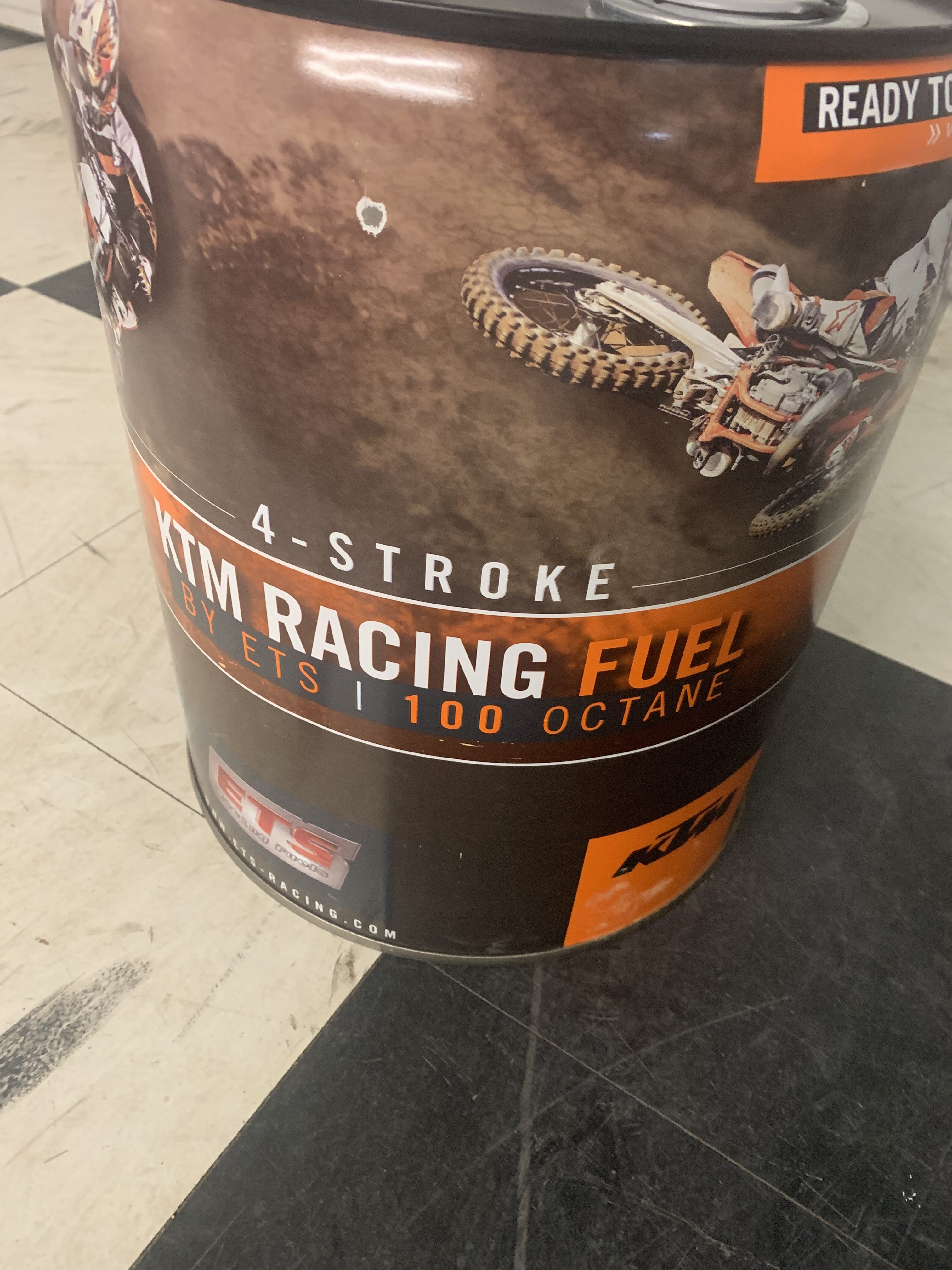A Bit Of Info About Aviation Fuel
I get this question emailed to me a lot, so I thought I would put some accumulative thoughts together about the fuel and post this right here. -KK
Aviation Fuel has been used as a low-cost substitute for high octane fuels for decades. This was more common in the hay days of 2 strokes, due to higher probability of detonation, and thus the change to 4 strokes has seen a decline in the popularity of “aviation race gas”. The reason for aviation fuel, once all the folk lore is stripped away, is simple; The most common aviation fuel (100 Low Lead) has a high-octane rating, is low cost compared to store bought race gas, and has a higher resistance to detonation than pump fuel. The relatively high (compared to pump gas) octane rating is achieved using a chemical tetraethyllead (TEL) (the lead in leaded fuel) which increased the resistance to detonation.
Detonation in an aircraft is a very bad thing. Imagine sticking a ring at 8000 ft, makes Mt. St. Helens look like an ant hill when you fall from that high. In a motorcycle, especially a two stroke, the balance of compression ratio, cylinder temp, air/fuel ratios, and the like can push a machine to the limit of detonation. A two stroke seems to love life at the edge, a 125 seems to run the best right before it stops running completely. An increased octane rated fuel resists detonation more than a lower octane rated fuel. This is the definition of the octane rating, notice the lack of power in that definition. A father of an aspiring 125 champion could make a high compression, lean running, crisp feeling engine, and run practice with Aviation fuel to lower the fuel bill. The fuel by no means produced the same power, throttle response, or any of the key characteristics of a good running machine, but it would allow the bike to run with a longer service life for less money.

Octane Rating
I used the phrase “octane rating” earlier. This was chosen instead of phrases like: “the octane in the fuel”, “has more octane”. Octane is a physical molecule, has physical properties, even has a very easy chemical formula:
Octane = C8H18
However, in modern applications, octane is not what makes a fuel more or less powerful, more or less resistant to detonation, or better or worse race fuel. The “octane” in a fuel is a simplification of “octane rating”, which is a test of the amount of compression alone that will cause fuel to combust. I will briefly describe the test, to hopefully clarify what the number means, and make clear that “octane rating” does not correspond to increased/decreased engine power.
Octane Test:
If you take pure octane (C8H18), vaporize it in air, and compress it rapidly, eventually it will combust on its own. This is equivalent to detonation in a real engine, in that there is no spark required to start combustion. You can do the exact same test with heptane (C7H16) which is similar in chemical composition, physical properties, but it will self-combust at a lower pressure than pure octane.
If you blend octane and heptane with a ratio of 50 parts octane and 50 parts heptane, the mixture would have an octane rating of 50. This is the definition of the octane rating. The mixture would self-combust at some pressure given the test described above. Any fuel mixture (diesel fuel and pump gas, 50:50 race gas and pump gas, vegetable oil and nail polish) that self-combusts at the same pressure in this test would have an octane rating of 50. You can imagine these mixtures would make different powers, but the fuel would have identical octane ratings.

Octane ratings are independent of power output.
Most pump gas has an octane rating of 87 to 95 depending on where you live. This means that the fuel coming out of the “87” hose at the gas station will self-combust at the same pressure as a 87:13 mixture of octane to heptane. The pump does not, however, pump out pure octane and pure heptane in that ratio. The fuel we buy is a mixture of near countless chemicals designed to meet environmental, storage, transportation, and performance requirements for the lowest possible costs. I will skip the rating methods and different octane numbers based off the test, but just know that the number on the pump in Europe vs the US does not tell the whole picture. Crossing international borders makes comparing fuel octane ratings difficult due to laws that govern what goes into that number on the pump.
This may then beg the question: “What is 110 octane rated fuel, you can’t have 110% of something in a fuel”? This is true, and the simple answer is the rating is just plotting self-combustion pressure past 100% octane test fuel. The chart below illustrates this.
Back to Octane Rating:
The octane rating is crucial, as it allows a consumer to know the fuel they are purchasing will not cause damage to the engine by detonation. One of the more practical ways to think about octane rating is the amount of energy needed to start the combustion process. This energy comes from 3 main sources, each adding on top of one another to eventually reach the threshold to start combustion. The main sources are:
Engine Temperature
The hotter the fuel is when entering the combustion chamber, the less energy needed to get the fuel to combust. Likewise, the higher the temperature of the components that make up the combustion chamber, the less energy required to start combustion. This is due to the thermal energy in the hot engine parts transfers to the fuel while the fuel is in the engine, waiting for the spark. These no doubt play a role in meeting the minimum combustion energy level, but if you pour gas on a piece of metal at 1.5 times the temperature of the cylinder walls, it will not self-combust. The temperature of the incoming air and temperature of engine parts can push an engine near detonation over the limit, but typically cannot combust fuel just by touching it.
Compression
This is the main perpetrator in detonation, and the main reason why people think race bikes “need” high octane race gas. When you compress any gas, the temperature goes up. Do this fast enough, and the increase in temperature can be substantial. If you have a can of compressed air, you can run this process in reverse. Spray the can against a piece of material and the air leaving the nozzle is ice cold (never point this at someone as it can cause frost bite even through clothes). Compressing air is the exact same process in reverse, so heat is generated rather than lost (exothermic vs endothermic for the nerds out there). The more you compress air, the more energy that is generated. Compress it enough, and enough energy is generated to combust the fuel without spark. This is the main source of energy when detonation occurs.
One additional note: compression is not uniform in the combustion chamber. The shape of the combustion chamber has a drastic effect on detonation risk. This comes from some areas of the head getting very close to the cylinder head, and the air struggles to move away fast enough when at high RPM. This causes local high pressure areas, which causes local higher temperature, which can push a small amount of fuel over the combustion limit. A small area detonating can spread the flame to the whole air fuel mixture, causing complete detonation.
This is part of the reason why a two stroke on the limit will have some small damage at the edge of the piston when running correctly, the pressure is highest, and some small detonation happens, pitting the surface. This is also why you typically only get detonation at high RPM. At low RPM, there is enough time for the air to have a more uniform pressure (and the heat generated by compression can bleed out through the cylinder). Without local high pressure spots, detonation is less likely.
Spark Plug
In a perfect engine, the spark is the last little bit of energy needed to start the combustion process, which is where you get the power from an engine. I won’t delve too deep into this, but just know that the spark is designed to start combustion in the center of the combustion chamber to allow for an even, non-damaging, pressure wave. When detonation occurs, it is typically not at the center, very uneven, and causes much higher cylinder pressures than what the engine was designed for. Lastly, a cooler or hotter spark plug is used to give a little extra energy for quick, even burning. A hotter plug means the porcelain piece is physically at higher temperature due to some design differences. The increased temperature, like cylinder or air temp, can be enough to push the engine into detonation.
There are many, many sources that engine designers consider when developing an engine for power character, running temperatures, RPM ranges, etc. that all factor into how the combustion process occurs. A paper on these items would be a great PhD thesis, and more than any sane person would be willing to read. These 3 are the simplest, and are the largest contributors to detonation risk.
In simple terms, a higher number octane rating means a higher energy level needed for combustion. When doing any engine modifications, you need to consider these factors and consider higher octane fuel if some change (typically compression ratio) will push the machine into detontation risk. You do not, however, get more power from higher octane fuel. In a stock machine, switching to a high octane fuel can sometimes decrease engine power output.
A Brief Word on Combustion
Combustion is very complicated when trying to design parts to optimize power. The concept governing it is simple. The commandments in the bible of power are rather simple:
“Get as much air and fuel, in the right ratio, into the cylinder as possible.”
“Thou shall not detonate”
“Achieve the maximum possible cylinder pressure as soon after Top Dead Center as possible”

The first comandment is for another conversation. The second we have already talked in detail. The third is what seperates the men from the boys, the cats from the dogs, and the good fuel from the bad. The power in race gas is the way that it builds pressure in the cylinder, increasing the power. Again, I want to make it clear that this is not because of the octane of the fuel. The simplified principle is that race gas burns quicker than standard pump gas. The faster a fuel burns, typically, the lower the octane. Defying this trend is what you pay for in race gas.
When fuel is too high octane, combustion starts later than it should (because the energy requirement for combustion is not met until more cylinder pressure is built up) and the burn rate of the fuel is slower. The chemical properties that make a fuel resistant to detonation also make the fuel burn slower once the combustion has started. An engine in a motorcycle is just a mechanism that turns pressure (from fuel combustion) into mechanical motion. If the pressure of the cylinder is high, it gets the engine moving faster, and making more power. If the fuel takes a long time to burn, the pressure is lower, and less power is generated.
Final Thoughts
There are a lot of extra pieces to this puzzle, but for simplicity, this is what fuel designers must balance.
Fuel needs to not combust prematurely (detonate), so an octane rating is needed to achieve this. Some bikes need 110 (turbocharged drag bikes), some bikes need 100 (modified two strokes), and some bikes need 93-95 (4 strokes, modified and standard).
Fuel needs to combust in a controlled, consistent manner so that cylinder pressure can be very high on the power stroke to get maximum power from each molucule of fuel. This is used for efficiency on road cars, and power in racing aplications.
Fuel needs to have an appropriate cost for the application. Pump gas makes some sacrifices in area 1 and 2 to achieve a cost. Race fuels sacrifice much less, but have a price that goes with it.
I hope that this offers some clarity on the complex liquid that is fuel. When buying fuel, you need to be realistic about your application needs, your desired cost, and have realistic expectations for what to expect when you pour it into your tank.
Don’t fall into the misunderstanding that the “octane” is in the fuel, or that you can add octane out of a bottle.
You don’t always need the highest octane for every application (sometimes it can undo power gains you probably paid good money for).
Octane rating does not cause power. Filling up the 1998 E350 with 91 won’t help my quarter mile time.
Race fuel cost what it does for a reason. It is high quality, engineered fuel that will actually give you power (not from the octane rating though).
Taking it Back to the Start, “What about av gas, is it good?”
Av gas, like any specialty fuel, is great for it’s application. It resists detontation, resists evaporation at low pressures (8000 ft), and is a decent price. However, av gas is designed for planes that run at 2800 RPM, not 14000, so it burns slower, and unless you have some wicked step up skills, the fuel evaporation probably won’t be a problem. If you have a two stroke that is detonating, I would ask yourself three things:
Do you need the compression ratio you are running?
Is your jetting right? You may need to richen up a bit to get the ‘ol race YZ490 to sing all day.
Don’t you work hard to play hard? Treat yourself to some high quality fuel, designed for motorcycles, with the appropriate octane rating. Don’t forget the last commandment of power (and first of lunch meat):
“Compromise Elsewhere”





